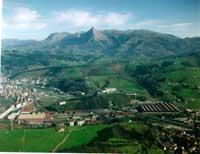Esther Larrañaga: “Finally we have an environmental policy”

The Law shall determine the aspects of the ACBC's environmental policy. In light of the new regulations, a policy of prevention will be developed based on the promotion of clean production, the prioritization of activities aimed at sustainable development and the assurance of the rational use of energy. In the Vice Ministry of the Environment, led by Esther Larrañaga, have spent about two years analyzing the details of the law, seeking consensus with different sectors of society and collecting the concerns of citizens. The result is the new Environmental Law of the ACBC.
Zetiaz-Elhuyar: The debt accumulated for 18 years is that which will be settled with the Law. How can one understand that it takes so much time to properly regulate such an important field?
Esther Larrañaga: Certainly 18 years is a long time. As the competition envisaged in the Statute, we are in favour of its development and have worked hard on it since we arrived at the Department of Land Planning, Housing and Environment. We cannot take responsibility for what our ancestors have not done; we have wanted to work for the future and, as we told citizens, we are working on resources for the future. On the other hand, and as far as we go, we must bear in mind that the environment is a very broad area; all this can be affected by agriculture, law, industry, health, etc. Therefore, we have had to work a regulation that affects almost all areas and that is not done one morning. Before presenting the draft we talked with many groups in search of consensus. Then comes the passage of Parliament, which in our opinion is very important when it comes to completing and rounded up the Law.
N-D: Before reaching Parliament, the text has been sent to about 50 groups for suggestions and proposals for amendments. What answer have you received?
R. L.: In general, we have heard very favorable opinions before knowing the Law itself, as people have once and for all appreciated that the problem and the effort made has been addressed. As for the suggestions, as you can imagine, each one has given priority to the details of their area and to us, the truth is that the information they have provided to us has been very useful, because better than anyone can talk about it those who work in this field.
N-D: However, environmental groups have contributed less than expected...

R. L.: So it is. We ask all environmental groups working in our community to study the law and contact us. Some have reproached us that they have spent little time, that we have spent two years working the Law and that we have spent very little time to study it all. This argument does not seem acceptable to me, the design and drafting of the Law cannot be equated with the amendments, and all other institutions have had time to make them. I do not know what the real reason is, but I can suspect that they have not wanted to participate, that they have wanted to be on the sidelines not to collaborate with the institutions. In my opinion, environmental groups should understand better than many other organizations the importance of this Law.
N-D: Among the new resources provided for in the law is the Environmental Impact Study. What will DIA teach us?
R. L.: The main objective of this law is prevention, real knowledge of the possible impact of different activities and, as far as possible, before they occur, for what serves the DIA. This study is still being carried out today, although the law clearly establishes what works or works should be submitted to the impact study. So far this requirement was too small and from now on the Act will use the EEA as a true preventive measure.
N-D: Suggestions from business associations have also been received. Is it mandatory to involve companies in the path of clean production?
R. L.: No doubt, but they will not do it by imperative of the Law, but because they will see that this is the way. And if we want to be competitive in the future, we must produce clean and with the least amount of energy possible, we cannot use more raw materials than necessary and we have to take advantage of more materials than current ones. The environment is not a credit without an expiration date, it can be exhausted in no case and should be avoided and make way. In my opinion, Basque entrepreneurs in general understand and value positively all those actions that are promoted for the protection of the environment. It is true that to put all this into practice it takes much more than agreeing. This process is unstoppable, but today we are at two speeds.
N-D: And does the law provide penalties and fines for those who go at slower speed?
R. L.: This is the most prominent aspect of the Law in many places. It is true that the characteristics of the fines have been adjusted and updated, since those we currently have were completely obsolete. However, the Office of the Vice-Minister did not want to influence this especially: if the previous training and training work is sufficiently effective, the fines will be lower than those planned.

N-D: Currently, the environmental policy of the ACBC is in the hands of different institutions: European Union, Central Government, Basque Government, Provincial Councils, Municipalities... How will the work of these entities be coordinated?
R. L.: The institutions are here to listen to the concerns of citizens and collect their proposals and the new Law also reinforces those avenues. This means that all these institutions will have environmental competence and will have to continue responding. In addition, the Law provides for the creation of two new institutions: Advisory Council and Environmental Commission. In these groups the tasks of each of them will be defined and appropriate forums will be established for the debate, reflection and proposal of new projects. When you say coordination, however, I understand it differently. I think it is normal and appropriate for different institutions to be involved in environmental policy, as citizens will go from one to the other based on their concerns, needs or habits. The problem is that we have to have a unique environmental policy if we want to do things right. And that's what we've proposed: a framework that drives collaboration, the only one, a compass that will guide our development.
Buletina
Bidali zure helbide elektronikoa eta jaso asteroko buletina zure sarrera-ontzian








